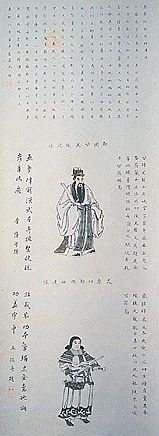
Back Zheng Zhilong Danish Zheng Zhilong German Zheng Zhilong Spanish Zheng Zhilong French Chhang Chṳ-liùng HAK Zheng Zhilong ID Zheng Zhilong Italian 鄭芝龍 Japanese 정지룡 Korean Zheng Zhilong Dutch
| Zheng Zhilong 鄭芝龍 | |||||
|---|---|---|---|---|---|
| 1. Count of Nan'an 2. Marquis of Pinglu 3. Duke of Ping 4. First-class Viscount 5. Marquis of Tong'an | |||||
 Illustration of Zheng Zhilong and his son Koxinga, Prince of Yanping | |||||
| Born | April 16, 1604 Fujian, Ming dynasty | ||||
| Died | November 24, 1661 (aged 57) Caishikou Execution Grounds, Caishikou, Beijing, Qing dynasty | ||||
| Burial | |||||
| Wives | Tagawa Matsu Lady Yan[1] | ||||
| Issue | Koxinga, Prince of Yanping(Zheng Chenggong) Shichizaemon Tagawa Zheng Xi | ||||
| |||||
| House | Zheng Dynasty (later called House of Koxinga because of his son) | ||||
| Father | Zheng Shaozu | ||||
| Mother | Lady Wang | ||||
| Religion | Chinese Buddhism, Taoism, Confucianism, Catholicism | ||||
| Occupation | Admiral, merchant, military general, pirate leader, politician | ||||
| Zheng Zhilong | |||||||||||||
|---|---|---|---|---|---|---|---|---|---|---|---|---|---|
| Chinese name | |||||||||||||
| Traditional Chinese | 鄭芝龍 | ||||||||||||
| Simplified Chinese | 郑芝龙 | ||||||||||||
| |||||||||||||
| Japanese name | |||||||||||||
| Kanji | 鄭 芝龍 | ||||||||||||
| Kana | ジェン・ジーロン | ||||||||||||
| Hiragana | てい しりゅう | ||||||||||||
| |||||||||||||
Zheng Zhilong, Marquis of Tong'an (Chinese: 鄭芝龍; pinyin: Zheng Zhilong; Wade–Giles: Ching Chih-lung; Pe̍h-ōe-jī: Tēⁿ Chi-liông; April 16, 1604 – November 24, 1661), baptismal name Nicholas Iquan Gaspard,[2] was a Fujianese (Hokkien) admiral, pirate leader, merchant, translator, military general, and politician of the late Ming dynasty who later defected to the Manchu Qing. He was the founder of the Zheng Dynasty, the father of Koxinga, the founder of the pro-Ming Kingdom of Tungning in Taiwan, and as such an ancestor of the House of Koxinga.
During his reign, he controlled a massive and capable fleet of pirates that later joined up with the Ming Dynasty's navy, which he then became a Ming admiral that controlled all trade and security in the southern waters off China. He held a powerful maritime empire which controlled more sea than land. After his defection, he was given noble titles by the Qing government, but was eventually executed because of his son's continued resistance against the Qing regime.